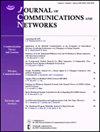Control-aware scheduling over multi-hop networks
IF 3.2
3区 计算机科学
Q2 COMPUTER SCIENCE, INFORMATION SYSTEMS
引用次数: 0
Abstract
With the proliferation of wireless networks as an indispensable component for a wide range of distributed Cyber-Physical Systems applications, the paradigm of the networking algorithms design independent from application goals abolishes. Thus, the control-aware design of the wireless resource management for wireless networked control systems (WNCSs) is shown to be more effective from the application perspective than the conventional approaches. In WNCS, the controller monitors and actuates the plant through the status updates received from the sensor over the network. This work focuses on application-aware transmission scheduling over multi-hop networks for WNCSs. As an intermediate metric, we use age of information (AoI) that captures the freshness of the data on the controller. Being a widely adopted metric for real-time applications, AoI does not consider the particular goal of control applications. Nevertheless, AoI is tightly coupled with the estimation error at the controller that, in turn, directly impacts control performance. We derive the distribution of AoI in the multi-hop network that exploits a time-varying transmission schedule. Using this distribution, we express the expected estimation error to formulate a minimization objective for the scheduling. We propose exact and heuristic methods for solving the optimization and compare different approaches to resource allocation with respect to estimation error and control costs. The proposed scheduling algorithm improves the control performance by at least 15% compared to the scheduling minimizing AoI. Introducing the schedule variability over time allows for further performance improvement by 30% in scenarios with scarce network resources.多跳网络控制感知调度
随着无线网络作为广泛的分布式信息物理系统应用中不可或缺的组成部分的普及,独立于应用目标的网络算法设计范式被废除。因此,从应用的角度来看,无线网络控制系统(WNCSs)的无线资源管理的控制感知设计比传统方法更有效。在wnc中,控制器通过网络上从传感器接收到的状态更新来监视和驱动设备。本研究的重点是WNCSs在多跳网络上的应用感知传输调度。作为中间度量,我们使用信息年龄(AoI)来捕获控制器上数据的新鲜度。作为实时应用程序广泛采用的度量,AoI不考虑控制应用程序的特定目标。然而,AoI与控制器的估计误差紧密耦合,这反过来又直接影响控制性能。我们推导了利用时变传输调度的多跳网络中AoI的分布。利用这一分布,我们表达了期望估计误差,从而制定了调度的最小化目标。我们提出了精确和启发式的方法来解决优化问题,并比较了不同的资源分配方法在估计误差和控制成本方面的差异。与最小化AoI的调度算法相比,所提出的调度算法的控制性能至少提高了15%。在网络资源稀缺的场景中,随着时间的推移引入调度可变性可以进一步提高30%的性能。
本文章由计算机程序翻译,如有差异,请以英文原文为准。
求助全文
约1分钟内获得全文
求助全文
来源期刊
CiteScore
6.60
自引率
5.60%
发文量
66
审稿时长
14.4 months
期刊介绍:
The JOURNAL OF COMMUNICATIONS AND NETWORKS is published six times per year, and is committed to publishing high-quality papers that advance the state-of-the-art and practical applications of communications and information networks. Theoretical research contributions presenting new techniques, concepts, or analyses, applied contributions reporting on experiences and experiments, and tutorial expositions of permanent reference value are welcome. The subjects covered by this journal include all topics in communication theory and techniques, communication systems, and information networks. COMMUNICATION THEORY AND SYSTEMS WIRELESS COMMUNICATIONS NETWORKS AND SERVICES.

 求助内容:
求助内容: 应助结果提醒方式:
应助结果提醒方式:


